LAWCONRESC 2025: Europeanisation and peacebuilding in focus at YSU
Jürgen Pirker was one of the organisers and lecturers at the summer school LAWCONRESC - Law and Conflict Resolution in the South Caucasus - 2025, which took place at Yerevan State University from 7 to 11 July. Building on the success of previous regional initiatives, the programme brought together students from Austria, Armenia, Lebanon, Germany and Turkey as well as an international team of renowned lecturers who ensured the highest academic standards of the event.
The summer school explored the multiple dimensions of Europeanisation and peacebuilding, with a particular focus on the case of Armenia. The participants analysed the impact of European integration on political institutions, security strategies, diversity management, conflict resolution, geopolitical decisions as well as social and cultural practices.
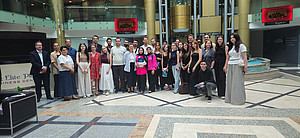
REWI Faculty Day 2025
At the Faculty Day of the Faculty of Law, Jürgen Pirker moderated a panel on "Pax Europeana" - with lectures on law and peace from Roman antiquity to the Ukraine war.

Spring Conference of the Austrian Commission of Jurists
As part of the spring conference of the Austrian Commission of Jurists in May 2025, Jürgen Pirker moderated a panel on the challenges posed to democracy by populists and on strategies for safeguarding democracy in the future.
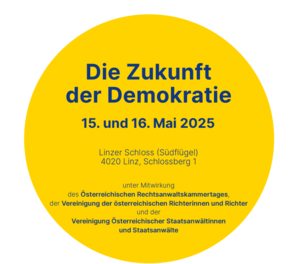
The conference to mark 70 years of Article 7 of the State Treaty of Vienna
Prof. Dr. Jürgen Pirker was invited to the conference as a speaker by the Carinthian Slovenian Lawyers' Association and the Austrian Ethnic Groups Centre.
The Association of Carinthian Slovenian Lawyers and the Austrian Ethnic Group Centre jointly organised the conference to commemorate the 70th anniversary of Article 7 of the State Treaty of Vienna. In this document of international law, Austria – a decade following the cessation of the Second World War – once again became an independent, sovereign and neutral state in the heart of Europe. This significant anniversary also holds particular importance for the Slovenian ethnic group residing in Austria.
The following renowned experts took part in the meeting: Prof Dr Heinz Mayer, Prof Dr Jürgen Pirker, Dr Anton Novak, Jandre Palatin, Rudi Vouk, Lea Vouk
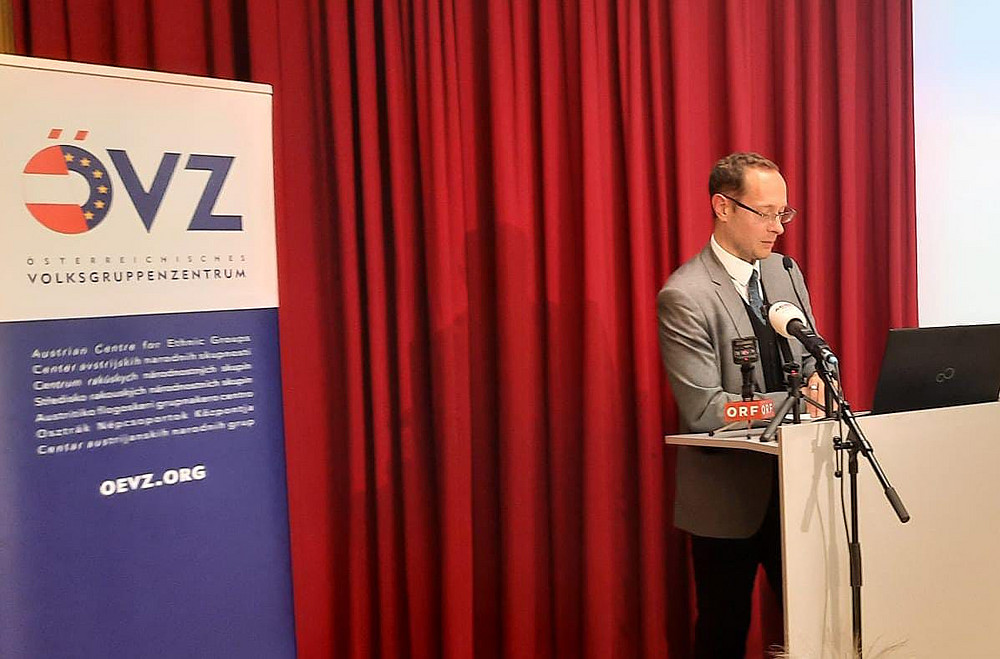
The Age of Empires. Europe and its Empires 1814-1914. 20-22 November 2024, Széchenyi István University of Györ (Hungary). Conference report for the Journal of World History
Professor Jürgen Pirker represented the University of Graz at the conference "Age of Empires I: Europe and its Empires 1814-1914", organised by the Faculty of Law and Political Science at Széchenyi István University, with the topic "Challenges of Nation Building through Empire: Constitutional Law, Imperial Court and Lessons for the Modern Protection of Minorities in Austria".
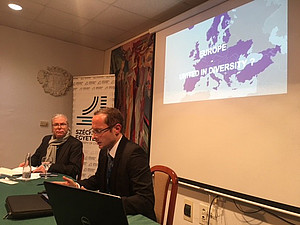
Collective rights: Structural issues and developments in case law on the freedom of association, nationality and religion in the Basic Law since 1848
Monograph by Jürgen Pirker (in German)
published by Verlag Österreich, 2024
This monograph sheds light on the role of collective rights as an instrument for the accommodation of collective identities and their challenges. Based on the fundamental rights of assembly, nationality and religion, the work analyses the development and functions of collective rights in Austria since 1848, examining the justification of these rights, the determination of collectives and their members, and the reconciliation of interests in the event of conflict.
You can find further information here.

World Forum for Democracy
On November 7, 2024, Jürgen Pirker represented the University of Graz at a World Forum for Democracy in a session "How to Counter Discrimination and Promote Equality and Diversity to Transcend Divides in a Society".
The World Forum for Democracy was hosted in co-operation with the Anti-Discrimination Department of the Council of Europe. The session explored the ways in which democracies can harness the power of diversity to address and mitigate issues of discrimination and exclusion. It provided a space for discussing comprehensive strategies for the inclusion of marginalised and minority groups, best practices and policy reforms for a more inclusive democracy.
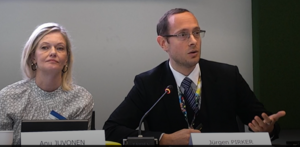
Romani Language conference at the Council of Europe
On November 5, 2024, Jürgen Pirker participated in the 5th edition of the conference "Safeguarding Romani Language", organized by the Council of Europe and the European Roma Institute for Arts and Culture on the occasion of the International Day of Romani Languages with a presentation "Promising Practices to Protect Romani. The Perspective of the Charter for Regional and Minority Languages". During the conference experts and practitioners of Romani language, educators and academics debated on Council of Europe standards and promising policies relevant to the protection, promotion and harmonisation of the Romani language.
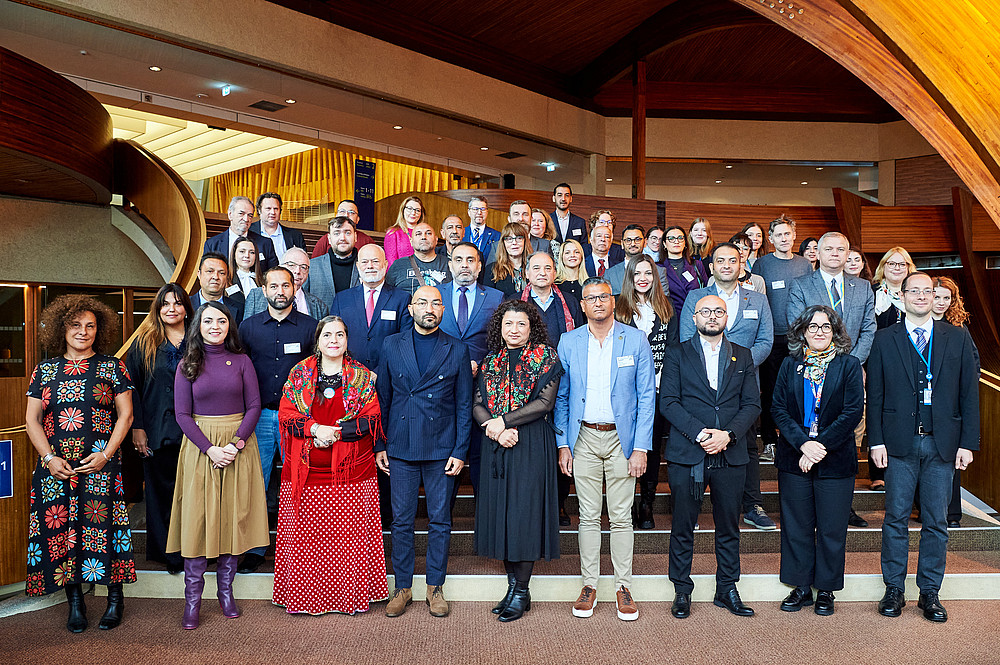
Promoting Minority Identity and Language – New Challenges
Conference in Klagenfurt
In October 2023, an international conference in Klagenfurt addressed the questions: What do we understand by a minority/ethnic group? How do members of ethnic groups locate themselves in groups? What steps should be taken to recalibrate the protection of ethnic groups in view of the current challenges?
Jürgen Pirker was part of the organizing committee and moderated the panel on "Law and Politics" with Prof. Brigitta Busch (Vienna) and Prof. Dr. Petra Roter (Ljubljana), Chair of the Advisory Board of the Council of Europe's Framework Convention for the Protection of National Minorities.
Teaching at Bar Ilan-University in Israel
In May 2023, Jürgen Pirker inctructs a class at the Law School of Bar Ilan-University on: The Protection of Fundamental Rights in the European Multilevel Legal Framework. The course provides an overview of the development of human and fundamental rights protection in Europe and Austria and focus on landmark decisions and recent cases decided by the Austrian Constitutional Court (Verfassungsgerichtshof, VfGH), the CJEU and the ECtHR to analyze the interaction of the national and supranational systems of human and fundamental rights.


Book Presentation at the Carinthian Parliament
Volksgruppenrecht in Bewegung
On May 15th a new edited volume on minoriy rights and minority politics in transition was presented at the Carinthian Parliament.


Book Presentation at the Diplomatic Academy in Vienna
Minority Rights and Minority Protection Policy on the Move
In April 2023, the recently published book "Minority Rights and Minority Protection Policy on the Move", edited by Gerhard Hafner, Karl Hren, Heinrich Neisser, Martin Pandel, Günther Rautz, Kathrin Stainer-Hämmerle, Martha Stocker, Daniel Wutti and Jürgen Pirker, was presented at the Diplomatic Academy in Vienna.
The book offers a reflection on the current system of minority rights and minority protection - not as a relic of yesterday, but as an instrument for the coexistence of tomorrow. The contributions are devoted to the current situation of the ethnic groups, the needs and identities of their members, the political representation of the ethnic groups, bilingual education and the further development of minority rights. Specifically, the empirical results of a study on the current state of bilingualism in Carinthia, which was commissioned by the Federal Chancellery in spring 2022, are summarised. A look at other minority situations, such as those in South Tyrol and in the German-Danish border region, or the European perspective with the reporting system of the Council of Europe's Framework Convention for the Protection of National Minorities and the "Minority SafePack" as a European citizens' initiative round off the informative contributions with different scientific and socio-political approaches and are intended to be the starting point for a constructive and solution-oriented dialogue.
All contributions and further presentations of the underlying conference of October 2022 can be found here in German and Slovenian.
University of Denver: Public Lecture
United in Diversity?
On November 14th, Juergen Pirker will give a public talk on “Europe: United in Diversity? Means for Protecting Minority Rights and Languages”. The talk will deal with challenges and perspectives of the protection of minorities and regional- and minority languages within the framework of the Council of Europe.
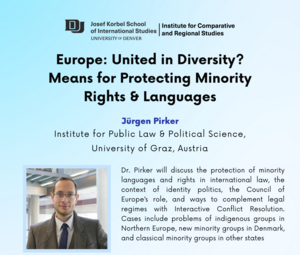
The Significance of the Treaty of Saint Germain‐en‐Laye in International Law
in light of the Austrian‐Czechoslovak Relation (German)
Beiträge zur Rechtsgeschichte Österreichs 2/2022
Within the Paris Peace Order, the Treaty of Saint‐Germain‐en‐Laye provides the legal basis for the newly established Republic of Austria: it defines its borders and name, regulates the protection of minorities, the army, war guilt or reparations, establishes a system of international peace maintenance, and deals with consequences of the dissolution of the Habsburg Empire. Considering core elements of the treaty, central aspects of the Austrian‐Czechoslovak rela‐ tions become visible: the existence of Austria as an independent state, including its economic survival, the limitation of its military capability, or the protection of its minorities. They reveal one baseline of the interstate and international relations: Austria, which was ought to be the rest, should continue to exist in this form.
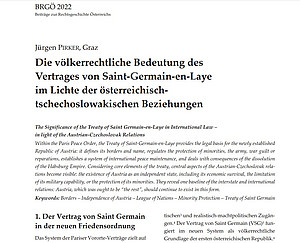
University of Minnesota: Brownbag lecture
On the occasion of the Austrian national holiday on October 26th, Juergen Pirker visited the University of Minnesota's Center for Austrian Studies and gave a talk on “A Habsburg Legacy: The Protection of Identity Collectives and Collective Rights in Austria since 1848”“A Habsburg Legacy: The Protection of Identity Collectives and Collective Rights in Austria since 1848”.
University of Denver: Research Seminar and Lecture
United in Diversity?
At the “Korbel Research Seminar” of the Josef Korbel International School, Juergen Pirker presented a paper on “Collective Rights and Collective Identities between Law and Politics – in Austria since 1848” on October 6th. The talk provided insights into Austrian history and the development of essential instruments of minority protection that Phd students and members of the faculty then discussed.
On October 13th,Juergen Pirker gave a guest lecture in the class of Prof. Timothy Sisk on “The Politics of Deeply Divided Societies” about “Memory Politics and Minority Rights – From Ethnic Conflict towards a Peace Region Alps-Adria”, presenting examples of interethnic conflicts and their regulation from Central Europe.
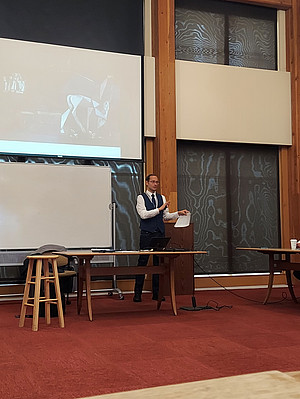
Denver - Fulbright Scholarship
In the winter term 2022/23, Jürgen Pirker will spend a research stay at the Josef Korbel School of International Studies at the University of Denver (Colorado, USA) and research the topic: United in Diversity? Overcoming Identity Politics through Integrative Conflict Resolution.

Ethnic Minority Policy – Yesterday's policy or policy for tomorrow?
MANJŠINSKA POLITIKA - POLITIKA OD VČERAJ ALI ZA PRIHODNOST?
Minority policy always faces new challenges: The languages of the ethnic groups must be preserved, even in a world of increased mobility, networking, globalization and digitalization. From September 29 to October 1, 2022, a conference will be dedicated to the current situation of the ethnic groups in Austria and beyond, the needs and identities of their members, the political representation of the ethnic groups, bilingual education and the further development of minority rights. The conference aims to reflect on current ethnic group policy - not as a relic of yesterday, but as an instrument for tomorrow's coexistence. Specifically, for example, the results of the OGM study on the current situation of bilingualism and the needs of Slovene speakers in Carinthia, carried out in spring 2022 on behalf of the Federal Chancellery, will be presented.
Program: here.
Substitution of Chair at HSU
From October 2021 until the end of September 2022, Jürgen Pirker substitutes a chair in "Public Law" at Helmut Schmidt University in Hamburg.
Symposium Unpacking Global Governance
16. December 2021 (online)
The department of Global Governance was founded at the Institute of the Foundations of Law of the University of Graz at the end of 2020, pooling expertise on law and social sciences.
Bearing the title "Unpacking Global Governance: Dimensions of Law and Politics in Context", the Founding Symposium of the department aims to highlight the phenomena of federal or multilevel system-building in law, politics and culture along the fault lines of state-centric approaches.
Panels will engage with the concept of ‘global governance’ from three perspectives: human rights and migration; peacebuilding in light of identity and religion; and trends of legal governance and legitimacy-building in regional integration. The Symposium further aims to transcend national boundaries debating notions of justice in the context of global health and digitalization.
Program and further information: here.
Collective Rights
Identity Collectives between Law and Politics - JRP 3/2021
The recognition of collective identities constitutes a challenge for contemporary cohesion policy; visible in debates about minority rights, integration or racism. The article deals with the protection of identity collectives, especially ethnic and religious minorities, through collective rights. In order to analyze their functions and the institutionalization of collectivity, the article develops a model of norm levels: from objective legal norms to cumulative (individual) and corporate rights. Their granting is based on different value premises - between individualism and collectivism. For identity collectives, collective rights fulfill protective functions, but these can only be exploited if dangers of assigning and fixing identities are avoided. An analysis of the jurisprudence of the highest courts on the rights of nationality and religion in the Basic Law of the State since 1869 shows how identity politics before and through the courts (co-)determine(s) the protection of identity collectives and the relationship of these collectives to the state and to each other. Three trends are revealed: collectivization, individualization, and pluralization. In order to ensure the protection of identity collectives in a pluralistic society without forcing identity politics through law, flexible instruments of institutionalization of collectivity are needed. They can contribute to the accommodation of exclusive identity politics that constitutes a threat to liberal democracy.
Article published in JRP 3/2021, 175-186 (German).
Educational Power and State Authority
Autonomy or Intervention? WPS 15/2021
The article explores the tension between the autonomy of the family and public intervention on the basis of educational power and intra-family violence. It considers the constitutive functions of law for legitimate and illegitimate exercises of power and violence – in the context of the family and their historical development, using Austria as an example. As private social unit, the family can remain a “refuge” for corporal punishment and – domestic – violence. In order to exclude the use of violence, the "juridification" of power and violence relationships is not enough. It also requires the creation of a legal consciousness while maintaining a complementarity of autonomy and intervention.
Article published in Graz Law Working Papers 15/2021, 1-17 (German).
Scholar of the Month
Democracy depends on diversity and the balance of interests. Law can ensure social cohesion by constantly renegotiating the rules on diversity to ensure peace. Law can construct and deconstruct diversity and, through suitable, flexible instruments, facilitate conflict resolution. Thus, it is important to learn from the past, to consider the political and social context and thus to continuously develop the instruments further.
Our Scholar of the Month, Jürgen Pirker, looks into the question of how we regulate Diversity. In his research the REWI professor further addresses the aspect of global challenges: Identity politics, polarisation, new and old nationalism are (re)emerging worldwide and threatening the rule of law and liberal democracy. Law aims to balance interests of individuals and groups. It regulates the diversity of identities determined by personal characteristics and group affiliations.
What makes his approach special? Find out more in a short clip. How do we regulate diversity? What global challenge could this research solve? Learn more in Jürgen Pirker´s sedcard.
The Impactof the Treaty of Saint Germain in International Law
At an international conference on AUSTRIAN-CZECHOSLOVAK RELATIONS 1900-1950 at the Univerzita Karlova/Karlsuniversität in Prague, Jürgen Pirker spoke about the significance of the Treaty of Saint Germain in international law.
Program: here.
Stream to re-watch the conference: here.
Minority Rights in Transition
The year 2020 saw some movement in the protection of ethnic groups in Europe: many steps forward, some steps back. To the surprise of many ethnic groups in Europe, this first (!) citizens' initiative in the European Parliament "Minority SafePack - one million signatures for diversity in Europe" achieved a majority of 524 out of 694 votes in December 2020, but only one month later the European Commission rejected the package of measures for lack of competence. In Austria, 45 years after the Ethnic Groups Act came into force, the question is what adjustments are needed to meet the current needs of ethnic groups in a diverse Europe. The government program 2020-2024 aims at some projects in the modernization of the protection of the ethnic groups. How can such a modernization take shape? The conference addressed this question from a regional, national, European and international perspective. It wants to contribute to a current discussion in Austria and Europe and offer a platform to work out solutions for new steps in the national and European protection of ethnic groups in a constructive dialogue. Jürgen Pirker took part in the organization and moderated the kick-off panel on visible bilingualism and language prestige including a discussion among representatives of politics.
Program: here.
Press article (Austrian Public Broadcasting: here.
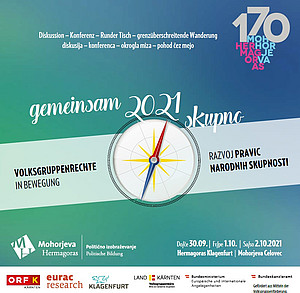
Research on Peace and Conflict
From September 28 to 29, a conference on peace and conflict was held at the University of Graz to highlight the expertise of researchers at the University of Graz on the problem areas of peace and conflict. The topics ranged from domestic violence or democratic participation to (world) wars and problems of (de)radicalization. The conference took place in the framework of the Conflict - Peace - Democracy Cluster of the Faculty of Law in cooperation with the Institute of Legal Foundations (Department of Global Governance) and the Research Network Heterogeneity and Cohesion. Jürgen Pirker opened the conference for the Department of Global Governance and moderated a panel on historical perspectives on peace and conflict.
Program: hier.

"Teaching: Excellent!"
Teaching Award for Juergen Pirker
Every year at the beginning of the winter semester, the University of Graz honors outstanding and innovative courses of the previous academic year by awarding its teaching awards. In the 2019/20 academic year, the focus was on the question of how to encourage students to actively think and collaborate. Jürgen Pirker was honored for his course "Constitutional Law and General Theory of the State", which was nominated by students for the award. The eight-member jury selected the course from a total of 32 nominations for the award: "Teaching: Excellent!
Further information on the teaching awards: here.
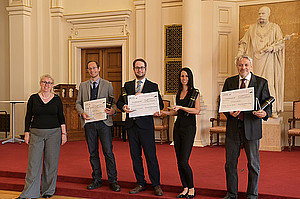
Memory Wars and Minority Rights
New Article on Memory Wars and Minority Rights: From Ethnic Conflict towards a Peace Region Alps-Adria? In drawing lessons from two initiatives in the Alps-Adriatic Region dealing with troubled pasts to counteract current forms of exclusive identity politics, the article proposes that effective minority protection depends on a conductive social environment that allows for the reflection of opposing narratives stemming from ethnic conflict and acknowledges diversity as enrichment.
Global Governance. What’s behind it?
I an interview with REWI, Jürgen Pirker gives an overview of the current activities of the Department of Global Governance..

REWI Expertise for the Council of Europe's Language Charter
In February, Jürgen Pirker was elected as Austrian representative to the Council of Europe's Committee of Experts of theEuropean Charter for Regional or Minority Languages. The Charter aims at the protection and promotion languages as part of the cultural heritage, democracy and cultural diversity in the member states. Since 1992, 25 states have ratified the Charter. The Committee of Experts takes part in the monitoring mechanism of the agreement.
Simultaneously, Prof. Klaus Poier (Institute for Public Law and Political Science) was appointed as Austrian expert for the Framework Convention for the Protection of National Minorities.
Feedback in online Teaching
In the "digiTales" discussion series, Jürgen Pirker and Dr.in Simone Adams from the Center for Digital Teaching and Learning discuss the use of digital feedback instruments in teaching. The Center offers numerous resources and services for digital teaching.
For a recording of the talk click: here.
The future of bilingualism
Conference recording and documentation
The recording of a conference on "The Future of the Carinthian Slovenes" is now available on Youtube. On the occasion of the 100th anniversary of the Carinthian Plebiscite, experts and representatives from politics and diplomacy focused on the history and future of bilingualism, successful examples of language preservation, open questions of minority protection and perspectives for its further development in Austria and Europe. Jürgen Pirker moderated the first day of the conference and comments on current issues in an accompanying documentation, which was broadcast several times on "Octo" and can also be viewed on youtube.
The complete conference recording can be found: here.
Global Governance
Since October 2020 Jürgen Pirker is head of the department "Global Governance" at the Institute for Legal Studies. Further information on the department's initiatives, research and teaching projects can be found on its new website: here.
Book Presentation with the Presidents of Austria and Slovenia
On 10 October Jürgen Pirker presented the book "Problems and Perspectives of the Protection of Ethnic Groups" to the Federal President Alexander Van der Bellen and the President of Slovenia Borut Pahor, as well as to the Ministers Susanne Raab and Helena Jaklitsch and the Governor of Carinthia Peter Kaiser. On this occasion the editors Gerhard Hafner, Karl Hren, Heinrich Neisser, Martin Pandel, Jürgen Pirker, Günther Rautz, Kathrin Stainer-Hämmerle and Martha Stocker were able to present the entire book series "skupno/gemeinsam 2020" to the presidents and ministers: "New and old minorities. Integration, Law and Politics" (2018), "Borders - Separation and Connection 1918-2018 "(2019) and "Problems and Perspectives of the Protection of Ethnic Groups. 100 years after the Carinthian Plebiscite".
Newspaper report (Sonntag) about the 100th anniversary of the Carinthian Plebiscite and the book presentation (German): here.
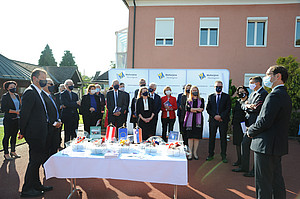
Problems and Perspectives of Minority Protection
Book and Conference Recording
The book "Problems and Perspectives of the Protection of Ethnic Groups" was published on October 10th. It is the result of two conferences on the Legacy of the State Treaty of Saint Germain-en-Laye 1919 (2019) and on the Future of the Carinthian Slovenes (2020). The book includes a DVD with interviews and statements from scholars, politicians and diplomats. A complete recording of the conference on the Future of the Carinthian Slovenes with all contributions will be available online (free of charge) soon.
Book - Content and Introducion:
Click here to download (German/Slovenian).
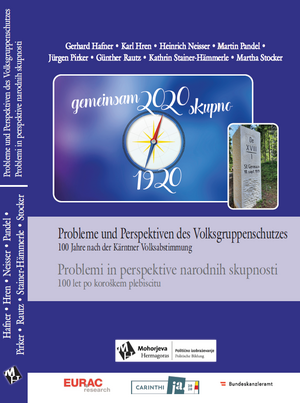
The Context of Oktober 10th, 1920-2020: State Formation, Borders, Minority Protection
On 24 September 2020, Jürgen Pirker gave a speach about political and consitutional changes in the context of 10 October 1920 and their consequencesat the symposium "Work and Democracy" of the Carinthian Chamber of Labour.
Program: here.
The Future of the Slovenes in Carinthia
The ethnic conflict has shaped Carinthia's recent history. The legacy of the past casts its shadow on the coexistence between the majority population and the ethnic group. At the same time, globalization, Europeanization, re-nationalization, migration or the emigration of members of ethnic groups pose new challenges for the protection of cultural diversity. 100 years after the Carinthian referendum, a conference from July, 2nd to July, 4th dealt not (only) with the past, but with the future: It was dedicated to dealing with the past and with old and new diversity, examined successful instruments of language preservation, necessary further developments of ethnic group law and the role of the diaspora in questions of minority protection / for the ethnic group.
Program: here.
Interview: here.
Media announcement: here.

Law and Climate Change
Schwerpunkt des Jungen Forums ÖJK
Climate change poses many challenges to the law. On the occasion of the opening conference of ClimLaw: Graz (Research Center for Climate Law) in June 2020 at the University of Graz, the Junge Forum der Österreichischen Juristenkommission in cooperation with ClimLaw: Graz has designed a JuWiss-focus week. The various contributions illuminate the complex topic of "Law and Climate Change" from a variety of perspectives.
The contributions - and all other texts of the Young Forum ÖJK - can be read on the Juwiss-Blog. They can be found: here.
100 Years Treaty of Saint Germain - 100 Years of Minority Protection in Austria
In October, a conference on the occasion of the 100th anniversary of the signing of the State Treaty of Saint Germain in 1919 will dealt with the legacy of this treaty and focused on current challenges in the protection of minorities: How do the 1919 peace treaties fit into the system of international relations that prevailed at the time? What is their legacy for the protection of minorities and how can this be further developed in the 21st century? What what role does Europe - in the form of the European Union or the Council of Europe - play in dealing with ethnic or linguistic minorities?
Program: here.
Power and violence
On June 1, Jürgen Pirker spoke at the spring conference of the Austrian Commission of Jurists on "Power and Violence from a Theoretical Perspective" and shed light on intra-family violence and the relationship between the state and the family.
Memory Politics and Minority Rights
On May 2nd, Juergen Pirker gave a talk at the University of Minnesota on "Memory Politics and Minority Rights in Central Europe (1867-2019)". Presented by the Center for Austrian Studies and the Department for History.
On May 14th, Juergen Pirker spoke about "Minority Rights and Dialogue: From Ethnic Conflict towards a Peace Region Alps Adria" at the Conflict Resolution Institute of the University of Denver.
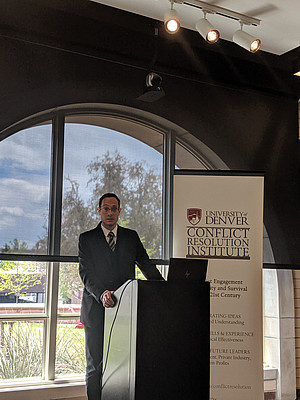
New Publications: Borders, Old and New Minorities
Recently published were the books "Alte und Neue Minderheiten: Integration, Law and Politics" and "Borders: Separation and Connection 1918-2018". The books were edited by Gerhard Hafner, Karl Hren, Heinrich Neisser, Martin Pandel, Jürgen Pirker, Günther Rautz and Kathrin Stainer-Hämmerle as part of the series "gemeinsam/skupno/together 2020".
Borders: Content and Introduction (German).
Old and New Minorities: Content and Introduction (German/Slovenian).
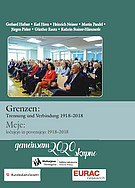
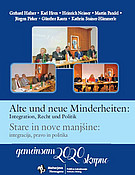
Guest Professorship at the University of Minnesota
From January to June 2019 Dr. Pirker is going to teach at the University of Minnesota (USA). The main topic of his teaching will be "Europe's Contested Borders, (Nation-)States and Peoples: Austria, the Alps and the Adriatic".
Borders/Grenzen/Meje 1918-2018
From 4 to 6 October, a conference within the series "gemeinsam/skupno 2020" was devoted to the topic of borders and border demarcations from the perspective of history, law and politics. The conference began on 4 October with a Round Table on "Border Experiences" and concluded on 6 October with a cross-border walk in Leifling/Libelice (A/SLO). At its core was the illumination of the historical border-finding processes of 1918 and their consequences from the perspective of law and political science.
Borders separate and connect, geographically and mentally. The borders drawn after the First World War separated "peoples" and populations and promoted nationalism, which experienced its most aggressive forms in the 20th century. The European Union has set out as a "peace project" to overcome borders that have recently been closed again in response to the migration and refugee crisis - in real terms and in people's minds. The anniversary of the Carinthian referendum provides an opportunity to deal with the consequences of border demarcations, their overcoming and the potential of border areas from an interdisciplinary perspective within the framework of the conference series 2018 to 2020.
Invitation: here (German).
Information about the conference Series: here (German).
Article by Jürgen Pirker in the Bulletin of the Carinthian Historical Society: "The Spirit of History(s): October 10 in Historical Memory and Political Education" (German).
Narratives in Conflict: Interview with CPD Policy Blog
In an interview with the CPD Policy Blog Jürgen Pirker explains the effects of narratives in civil conflict transformation. He refers to his publication "History/ies in Conflict: On the Interactions of Stories, Law and Politics" (German).
Interview: here.
Requirements for legal training in academia and practice
On September 19, 2018, the Young Forum ÖJK hosted an event on the question: "What should and can legal education achieve?" The requirements for legal education were discussed with experts from academia and practice and members of the Young Forum ÖJK.
Data protection and privacy
The Young Forum ÖJK was involved in the spring conference of the Juristenkommission from 31.5.-2.6. on "Datenschutz - Geheimnisschutz - Privatsphäre"(program) with a contribution on the topic "Jenseits von DSGVO und EU Datenschutzpaket: Ein internationales Abkommen zur Regulierung staatlicher Überwachung?" by Dr. Oskar Gstrein (Gröningen). In addition, the Young Forum accompanied the conference on the occasion of the entry into force of the European General Data Protection Regulation in a joint focus with the Juwiss Blog for Young Scholars in Public Law - with contributions on current issues of the GDPR, international regulatory options in data protection and possible encroachments on fundamental rights through nudging. The ten articles can be read here.
History/es, Law and Politics
At the Faculty of Law, Ambassador Dr. Valentin Inzko, High Representative for Bosnia and Herzegovina, und Dr. Marjan Sturm, President of the Zveza slovenskih organizacij na Koroškem, gave a speech on challenges of dialogue and reconciliation in Carinthia, Slovenia and Bosnia. Afterwards, Prof. Helmut Konrad, Prof. Joseph Marko and Ass-Prof. Jürgen Pirker discussed issues of dealing with troubled past and the "management" of interethnic-conflict through law and politics.
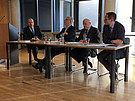
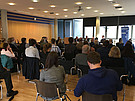
Memory Cultures, Law and Peace Building
At the presentation of the publications "Historie/s in Conflict" (Jürgen Pirker) and "Memory Communities Kärnten/Koroška" (Daniel Wutti, Nadja Danglmaier, Andreas Hudelist, Samo Wakounig) at University of Klagenfurt, Landeshauptmann Peter Kaiser, Dr. Nadja Danglmaier, FH-Prof. Kathrin Stainer-Hämmerle, Univ.-Doz. Hellwig Valentin and Univ.-Prof. Werner Wintersteiner discussed issues and perspectives of memory politics, minority protection and peace education in past, present and future.
Further Information (German): here.
Interview (SONNTAG; German): here.
History/ies in Conflict: Book Presentation and Discussions on the Interdependence of History, Law and Politics
On Mai, 8th and 15th, the book by Juergen Pirker on "History/ies in Conflict: The Consensus- and Dialogue Process in Carinthia: from National Conflict towards a Peace Region Alps-Adria" will be presented and discussed at the University of Klagenfurt and University of Graz.
Invitation and program of the event at University of Klagenfurt (May 8th, Stiftungssaal der Kärntner Sparkasse, Universität Klagenfurt, 16.00): Book presentations and discussion with the governor of Carinthia Dr. Peter Kaiser, Mag. Dr. Nadja Danglmaier, FH-Prof. MMag. Dr. Kathrin Stainer-Hämmerle, Univ.-Doz. Dr. Hellwig Valentin and Univ.-Prof. Dr. Werner Wintersteiner about History, Politics and Peace Building. Moderation: Ass.-Prof. DDr. Jürgen Pirker and HS-Prof. MMag. Dr. Daniel Wutti.
Invitation and program of the event at University of Graz (May 15th, Sitzungszimmer der Rechtswissenschaftlichen Fakultät, RESOWI Zentrum, SZ 15.21, 17.30): Book presentation, with Statements of Dr. Valentin Inzko, High Representative of Bosnia and Herzegowina, and Dr. Marjan Sturm, followed by a discussion with Univ-Prof. Dr. Dr. hc Helmut Konrad, Univ.-Prof. Dr. Joseph Marko and Ass-Prof. DDr. Jürgen Pirker about History, Law and Politics in Complex Conflicts and within the Centenary of the Founding of the Republic of Austria in 2018. Moderation: Ao. Univ.-Prof. Dr. Anita Ziegerhofer and Ass.-Prof. Dr. Benedikt Harzl.

Conference: New and Old Minorities
On Friday, October 6th 2017, an interdisciplinary conference dealt with "New and Old Minorities: Integration, Law and Politics" and specifically deal with the functions of "classical" instruments of minority protection and the challenges caused by migration for the effective minority protection in ever more pluralistic societies.
Program: here.
Information about the Conference Series: here.
Statement of the Carinthian Government: here.
Added value through minority languages
In an interview for the press, Dr. Pirker presents the central theses of his work "Minderheitenschutz und Sprachförderung" (2017, Verlag Böhlau): "Legal research on South Tyrol and Carinthia shows how minorities can be better protected and how multilingualism connects people: Language promotion is central," summarizes the journalist and historian, Dr. Posch.
Click here for the report.
Crisis of liberal Democracy and Young Forum of the Austrian Commission of Jurists
In the Conference of the Austrian Commission of Jurists on the "Crisis of liberal Democracy" Prof. Eva Schulev-Steindl and Jürgen Pirker presented the Young Forum as new initiative of the Austrian Commission.
Divided Societies XX
At the Interuniversity Center in Dubrovnik Dr. Pirker participated in a course on Divided Societies. The 20th turn of the international lecture was dedicated to "Memory Wars".
Diversity Management and Collective Rights
In a workshop at Johns Hopkins University in Washington DC, Juergen Pirker gave a speech on Diversity Management and Collective Rights. Dr. Benedikt Harzl (REEES, University of Graz; current Austrian Marshall-Plan-Fellow at SIAS, Johns Hopkins University) opened the Workshop with an introduction to law and politics and case studies from the Caucasus Region.
Conference: The Transformation of Intractable Conflicts
From March 16th to 18th the third conference within the series "The Transformation of Intractable Conflicts" took place at the Weatherhead Center, Harvard University. Jürgen Pirker chaired a panel on "Interactice Conflict Resolution and Releated Approaches". The conference was organized by the Herbert C Kelman Institute, the Harvard Weatherhead Center for International Affairs and the Universities of Graz and Klagenfurt. It was an initiative of the Kelman Network and was dedicated to the 90th Birthday of Prof. Herbert C Kelman.
Program: here.
Teaching in China
In February and March 2017 Dr. Pirker gave a two weeks-course on "Rule of Law in Austria, Germany and the Europen Context" at Nanjing University, China.
For more Information about the German-Sino Institute of the Universities Göttingen and Nanjing click here.
Science Award 2016
In November 2016, Dr. Pirker was awarded a "Leopold Kunschak Award for Science" for his thesis on Minority Protection and Language Promotion. The "Gand Honorary Award" was given to the German Federal Minister of Finance, Dr. Wolfgang Schäuble. The Prices were awarded by the Austrian Vice Chancellor, Dr. Reinhold Mitterlehner.
Award
Best-of-REWI Award 2014: University of Graz (Pictures)
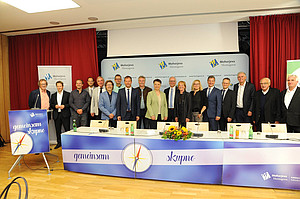
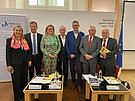
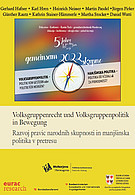

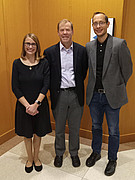
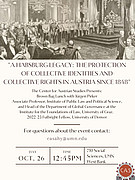
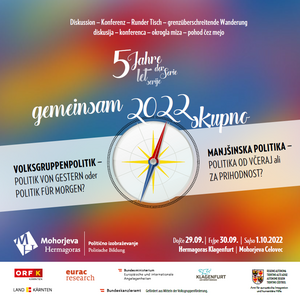
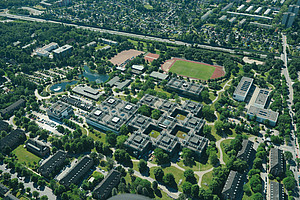

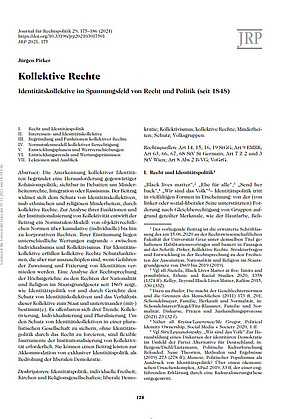
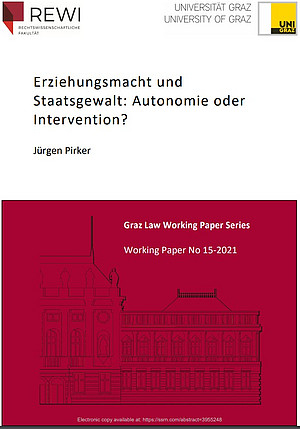
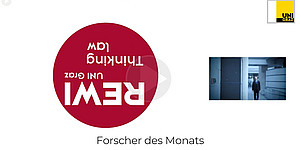
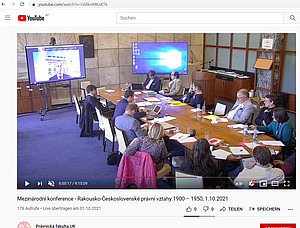

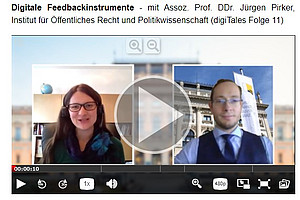
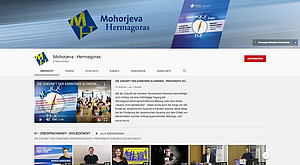

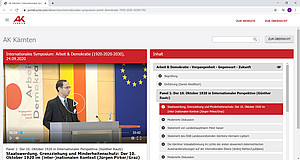
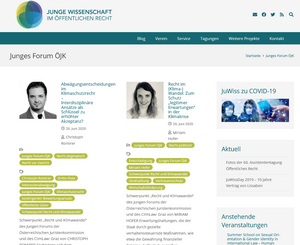





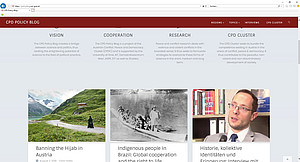
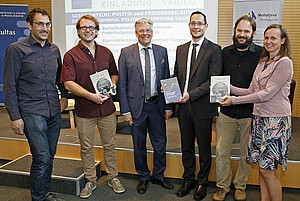

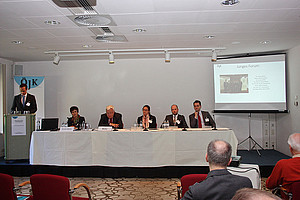
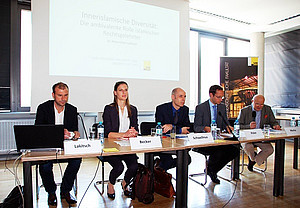
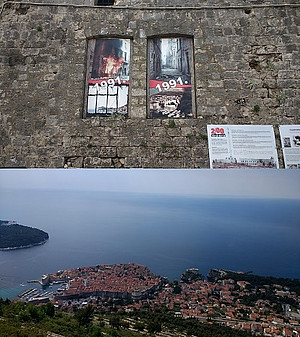

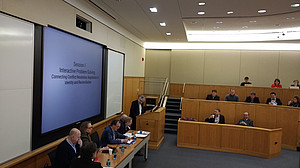
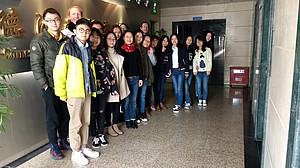
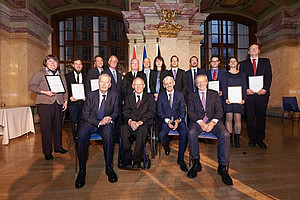
![[Translate to English:] Best of Rewi 2014 [Translate to English:] Best of Rewi 2014](https://static.uni-graz.at/fileadmin/_processed_/0/7/csm_PirkerBestofREWI2014_aefe48c73e.jpg)